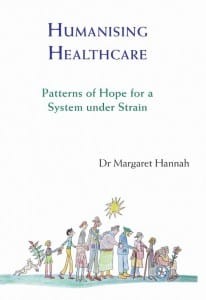
Despite the somewhat unwieldy sub-title of the book, this text is a very readable analysis of current healthcare systems. This book was engaging from the start with the opening quote: “humankind gets people to the moon, created devices which connect us with others anywhere in the world ….. so why can’t we find a sustainable model for healthcare?”
The thesis of the book is that modern medicine has lost its way, and is out of control (often delivering only marginal gains to patients). To tackle the chronic, relapsing burden of disease in the 21st Century, (nearly half of all hospital in-patients are over 60 and ¼ over 75), she asserts that we need to take stock of the NHS’s biomechanical thinking, its pervasive military style delivery systems, plethora of clinical specialists and ‘integrated’ care (which in reality is really ‘additive’), which leave too many patients feeling lost and alienated.
The NHS culture needs to transform and concentrate instead on core human relationships within healthcare, its staff, and deliver person-centred care – what patients, families and communities want.
The text is well referenced and packed with examples of successful healthcare in the UK and abroad, and draws on the writer’s knowledge and experience as a Public Health Consultant working in Fife. The author’s ideas are supported with facts (sometimes surprising e.g. “for the first time ever in peacetime we are now facing a prospect of a generation of parents outliving their children”), and innovative healthcare projects that have been researched and evaluated as effective . Many of these were community based and resulted in improved resource use, significant cost reductions and, importantly, better patient outcomes.
She argues that refocusing on human relationships will address the greatest health crisis of our time, and lead to a complete transformation of the NHS into one that is affordable, one in which the patients have control and meaningful choices, and where staff are providers and partners in care. I recommend this book to all our readers.
Linda Pollock
QNIS Council Vice Chair